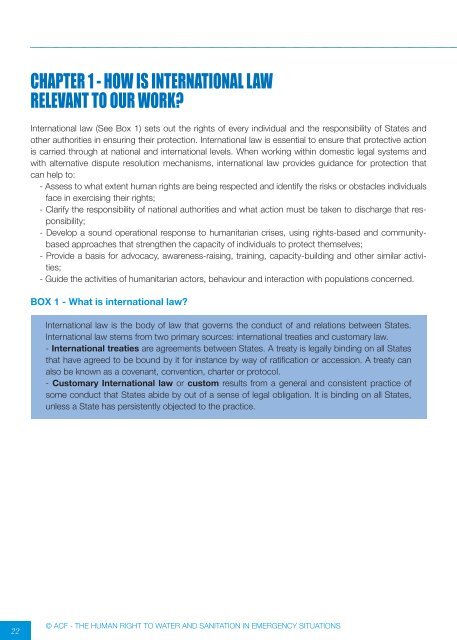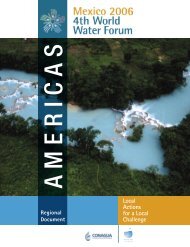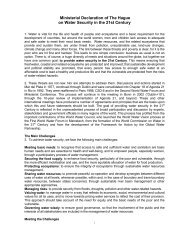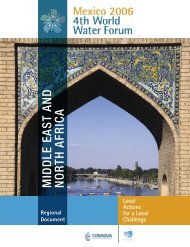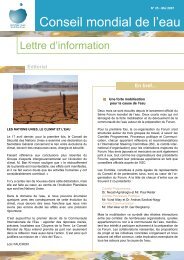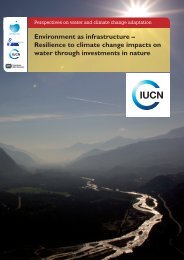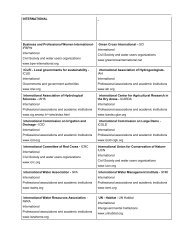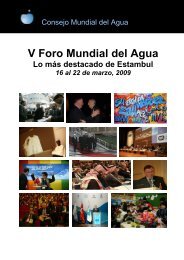the human right to water and sanitation in emergency situations
the human right to water and sanitation in emergency situations
the human right to water and sanitation in emergency situations
Create successful ePaper yourself
Turn your PDF publications into a flip-book with our unique Google optimized e-Paper software.
22<br />
CHApTER 1 - HOW IS INTERNATIONAl lAW<br />
RElEvANT TO OUR WORk?<br />
International law (See Box 1) sets out <strong>the</strong> <strong>right</strong>s of every <strong>in</strong>dividual <strong>and</strong> <strong>the</strong> responsibility of States <strong>and</strong><br />
o<strong>the</strong>r authorities <strong>in</strong> ensur<strong>in</strong>g <strong>the</strong>ir protection. International law is essential <strong>to</strong> ensure that protective action<br />
is carried through at national <strong>and</strong> <strong>in</strong>ternational levels. When work<strong>in</strong>g with<strong>in</strong> domestic legal systems <strong>and</strong><br />
with alternative dispute resolution mechanisms, <strong>in</strong>ternational law provides guidance for protection that<br />
can help <strong>to</strong>:<br />
- Assess <strong>to</strong> what extent <strong>human</strong> <strong>right</strong>s are be<strong>in</strong>g respected <strong>and</strong> identify <strong>the</strong> risks or obstacles <strong>in</strong>dividuals<br />
face <strong>in</strong> exercis<strong>in</strong>g <strong>the</strong>ir <strong>right</strong>s;<br />
- Clarify <strong>the</strong> responsibility of national authorities <strong>and</strong> what action must be taken <strong>to</strong> discharge that responsibility;<br />
- Develop a sound operational response <strong>to</strong> <strong>human</strong>itarian crises, us<strong>in</strong>g <strong>right</strong>s-based <strong>and</strong> communitybased<br />
approaches that streng<strong>the</strong>n <strong>the</strong> capacity of <strong>in</strong>dividuals <strong>to</strong> protect <strong>the</strong>mselves;<br />
- Provide a basis for advocacy, awareness-rais<strong>in</strong>g, tra<strong>in</strong><strong>in</strong>g, capacity-build<strong>in</strong>g <strong>and</strong> o<strong>the</strong>r similar activities;<br />
- Guide <strong>the</strong> activities of <strong>human</strong>itarian ac<strong>to</strong>rs, behaviour <strong>and</strong> <strong>in</strong>teraction with populations concerned.<br />
BoX 1 - What is <strong>in</strong>ternational law?<br />
International law is <strong>the</strong> body of law that governs <strong>the</strong> conduct of <strong>and</strong> relations between States.<br />
International law stems from two primary sources: <strong>in</strong>ternational treaties <strong>and</strong> cus<strong>to</strong>mary law.<br />
- International treaties are agreements between States. A treaty is legally b<strong>in</strong>d<strong>in</strong>g on all States<br />
that have agreed <strong>to</strong> be bound by it for <strong>in</strong>stance by way of ratification or accession. A treaty can<br />
also be known as a covenant, convention, charter or pro<strong>to</strong>col.<br />
- Cus<strong>to</strong>mary International law or cus<strong>to</strong>m results from a general <strong>and</strong> consistent practice of<br />
some conduct that States abide by out of a sense of legal obligation. It is b<strong>in</strong>d<strong>in</strong>g on all States,<br />
unless a State has persistently objected <strong>to</strong> <strong>the</strong> practice.<br />
© ACF - THE HUMAN RIGHT TO WATER AND SANITATION IN EMERGENCY SITUATIONS


